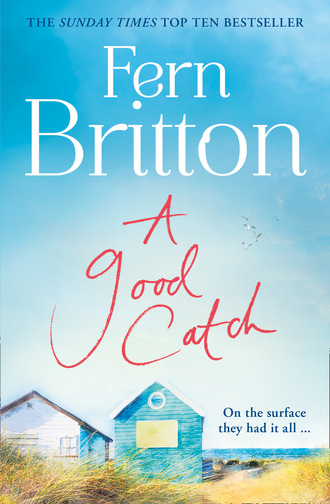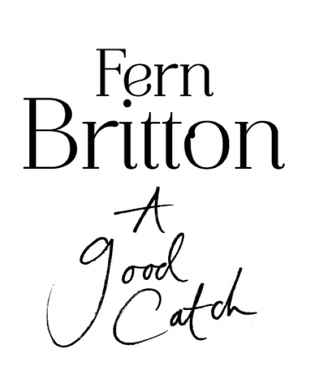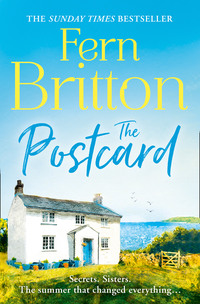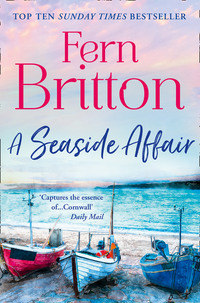
Полная версия
A Good Catch



Copyright
Published by HarperCollinsPublishers Ltd
1 London Bridge Street
London SE1 9GF
www.harpercollins.co.uk
First published in Great Britain by HarperCollinsPublishers 2015
Copyright © Fern Britton 2015
Cover layout design © HarperCollinsPublishers 2016
Cover illustrations © Shutterstock.com
Fern Britton asserts the moral right to be identified as the author of this work.
A catalogue copy of this book is available from the British Library.
This novel is entirely a work of fiction. The names, characters and incidents portrayed in it are the work of the author’s imagination. Any resemblance to actual persons, living or dead, events or localities is entirely coincidental.
All rights reserved under International and Pan-American Copyright Conventions. By payment of the required fees, you have been granted the non-exclusive, non-transferable right to access and read the text of this e-book on screen. No part of this text may be reproduced, transmitted, down-loaded, decompiled, reverse engineered, or stored in or introduced into any information storage and retrieval system, in any form or by any means, whether electronic or mechanical, now known or hereinafter invented, without the express written permission of HarperCollins.
Source ISBN: 9780007562947
Ebook Edition © April 2015 ISBN: 9780007562954
Version: 2019-02-19
Dedication
To my darling Goose.
Thank you for making me laugh so much.
Love you, Mum.
Table of Contents
Cover
Title Page
Copyright
Dedication
Prologue
Part One
Chapter 1
Chapter 2
Chapter 3
Chapter 4
Chapter 5
Chapter 6
Chapter 7
Chapter 8
Chapter 9
Chapter 10
Chapter 11
Chapter 12
Chapter 13
Chapter 14
Chapter 15
Chapter 16
Chapter 17
Chapter 18
Chapter 19
Chapter 20
Chapter 21
Chapter 22
Chapter 23
Chapter 24
Part Two
Chapter 25
Chapter 26
Chapter 27
Chapter 28
Chapter 29
Chapter 30
Chapter 31
Chapter 32
Chapter 33
Chapter 34
Chapter 35
Chapter 36
Chapter 37
Chapter 38
Chapter 39
Afterword
Keep Reading …
About the Author
By the Same Author
About the Publisher
PROLOGUE
Greer Behenna had never felt so drained. Relieved to be alone at last, she closed her front door and leant her head on its cool, solid wood.
The inquest had been conducted with meticulous precision. The courtroom, even with its lights on, couldn’t pierce the gloom of the winter’s day hanging outside its windows. The warmth from the old-fashioned radiators filled the air, right up to the high and corniced ceiling, with a density of heat that had left Greer drowsy and with the beginnings of a headache. She had listened to all that the witnesses had said and heard none of it. When called to the stand she gave her own evidence, but remembered little of it now.
So separated were her mind and body she almost floated up the stairs and into her room, where she pulled off her black Armani dress and carefully hung it up in the wardrobe. She found her jeans and a warm jumper and put them on. In the kitchen she filled the kettle. Tom was outside, sitting on the windowsill and mewing crossly. As soon as he saw her he jumped down and clattered in through the cat flap. She fed him. The kettle boiled and she wondered what she’d put it on for. She couldn’t face another cup of tea that day. She went to the fridge but there was no wine. She’d drunk the last of it the previous night. She drifted through into the drawing room and then the dining room, where they’d had so many family celebrations. Back in the drawing room, she reached for the remote control. The television came to life with a rather camp man talking about antiques; she switched the TV off again. Restlessly she got her coat and warm boots from the boot room, picked up her keys from the console table in the hall and left Tide House for the only place that felt right: the cove.
Greer had found herself seeking the solace of the cove more and more of late. The tide was out and she walked down to the water’s edge. She found a patch of smooth rock to sit on that was otherwise covered in mussels. She closed her eyes and breathed in the scent of ocean and seaweed. She saw him in her mind’s eye. He was standing in the surf, casting his line to catch the sea bass that were lurking beneath the waves. His back was to her but she knew that he’d be frowning slightly, concentrating on the fish, his fingers feeling for a bite on the line. She watched him turn round and, when she saw his face, it wasn’t the man that she saw, but the boy. His blond hair, almost white from the heat of summer, plastered around his face, his eyes the colour of the sea, looking at her coolly with that familiar mix of curiosity and indifference. Remembering his face as it was then, Greer was suddenly taken back to the long hot summer of 1975, when she was almost five, and she first saw Jesse Behenna …
*
He was sitting on Trevay quay, loading a crab line with a mackerel head. His tousled blond head was bent closely to the task and, when he was happy that the bait was secure on the hook, he swung the line to and fro before dropping it into the deep, oily water.
He drummed his dangling feet over the slimy sea wall in concentration. For a few seconds he watched the line sink to the bottom. Satisfied that it had, he shifted his face to the horizon and screwed up his eyes, as if hoping to bring into focus something that he couldn’t see. He rubbed the back of his hand across his nostrils and then turned his attention to a bucket by his side.
‘’Ere you go, lads,’ he said, putting a hand into the bag of chips by his side before dropping one into the bucket. Greer saw the quick scuttle of pincers through the opaque of the plastic.
‘Move up, Greer.’ Her mother, Elizabeth, sat down next to her on the sun-warmed, sea-roughened wooden bench, checking for seagull mess. ‘Your dad’s just bringing the ice creams. Don’t get any on your dress.’
‘Can I do some crabbing?’
Greer’s mother looked almost offended. ‘Whatever for?’
‘It looks fun.’
Her father sauntered up, carrying three dripping 99s. ‘’Ere you go, my beauties.’
‘Can I have a go at crabbing, Daddy?’
He looked at her sideways. ‘What does your mother say?’
‘I say she’s in her best dress and I have quite enough laundry to do,’ said her mother.
‘She can take it off,’ replied her father, Bryn, winking at Greer. ‘Lovely day like today.’ He ignored his wife’s horrified stare. ‘Eat up your ice cream and we’ll nip to the shop and get you a crab line.’
‘And a fish head.’
‘Yeah, and a fish head.’
‘And a bucket.’
‘Of course, can’t go crabbing without a bucket.’
The sun was warm on her bare shoulders as she sat, in just her vest and pants, on the gritty, granite sea wall, just a few feet from the boy. She dangled her legs, thrillingly and dangerously, over the sea wall, just as the boy was doing.
She had seen him pull in several crabs and drop them in his bucket and was desperate for the same success.
‘Right. There you go. Mind that hook, it’s sharp.’ Her father passed her the baited line.
She looked at the lump of fish stabbed through with the large hook and nodded solemnly. ‘I will, Daddy.’
‘Do you want me to show you how to feed the line out?’
‘I can do it.’
‘Well, keep it close to the wall. The crabs like it in the dark. The tides comin’ in so they’ll be washed in with it. ’Tis no good crabbing on an outgoing tide.’
Greer was getting impatient. All the crabs would be in that boy’s bucket if she didn’t hurry up.
‘Let me do it, Daddy.’
She took the square plastic reel from her father and slowly let the line out. She leant her head as far forward over the edge of the wall as she dared.
‘It’s landed, Daddy.’
‘Good girl. Now sit on the reel and it won’t fall in. If you lose it, I ain’t buying you another.’
She lifted her thigh, already growing pink from the sun, and wedged the sharp plastic of the reel firmly under her buttock.
‘Can I pull it up now?’
‘Give it a couple of minutes.’
She looked over at the boy who was again wrinkling his eyes and staring at the horizon. Her father surprised her by talking to him. ‘’Ello. You’re young Jesse Behenna, aren’t you?’
The boy reluctantly turned his gaze to the man talking to him. ‘Yeah.’
‘Watching for your dad’s boat, are you?’
‘Yeah. ’E’s been out three days.’
‘Has he? That’ll be a good catch he’s bringing in then.’
‘Yeah. As long as the bastard at the market gives them a good price.’
Greer’s father laughed. ‘Is that right?’
‘Yeah.’
‘I’ve got one!’ Greer was pulling up her line and, as it broke water, her father and the boy could see that she had three fat, black, glittering crabs clinging greedily to the bait.
‘Bring ’em in slow, Greer.’
‘Get the bucket, Daddy!’ she called excitedly.
‘That’s it. Nice and slow. Now drop ’em in.’
Greer watched as the three crabs plopped into her bucket.
‘Mummy! I got three in one go!’
‘Did you?’ responded her mother from the safety of the bench; she was still not looking up from her magazine. ‘Well done, darling.’
‘Do you want to feed them a chip?’ The boy passed over the bag.
She picked up the fattest chip she could see and dropped it into her bucket.
‘Thank you.’
The crabs, which had been scrapping with each other, now started scrapping with the chip.
‘Want one yerself?’ asked Jesse.
Greer darted a glance at her mother, who shook her head. ‘You’ve already had an ice cream, Greer. You don’t want to get fat.’
Greer looked back at Jesse. ‘No, thank you.’
‘Suit yourself,’ he said, shovelling a handful into his mouth.
‘What bait you using?’ he mumbled, standing up and wiping his hands on his cotton shorts. He ambled over, with his hands in his pockets, to look at her catch.
‘Fish,’ said Greer.
‘What sort of fish?’
Greer’s father replied, ‘Mackerel, boy. But I reckon ’tis bacon that’s the best. When I were a nipper, I always used bacon.’
The boy looked at him, nodding his head slowly, weighing up the pros and cons of mackerel versus bacon. ‘I prefer mackerel. It’s what Dad says is best and he’s the best fisherman in Trevay.’
‘Then he must be right,’ smiled Greer’s father.
The emptying of the crabs back into the water was a serious business. One by one they were counted and Greer had a pleasing sixty-four to Jesse’s eighty-one.
‘Not bad. For a beginner,’ he told her.
‘Bryn,’ called Greer’s mother, impatient to get home to a cooling shower. ‘It’s time to get Greer back.’
‘Stop your nagging, woman. We’m ’aving a good time.’
‘I’ve got to get tea on and it’s getting late.’
‘I told you to stop nagging,’ he said, and silenced her with a look.
The children said their goodbyes and Greer’s father said, ‘Send my regards to your dad.’
‘What’s your name?’ asked Jesse.
‘I’m the bastard at the market who never gives him a good price.’
*
Greer snapped her eyes open, remembering Jesse’s straight talking as being so typical of him, even as a young boy. He always seemed so sure of himself; he didn’t ever seem to care what anyone thought. But had she ever really known him? Had any of them? She continued staring out into the churning, dark sea and pulled her coat closer around her, though she knew that it wasn’t the winter chill that was making her shiver.
The sea in front of her was devoid of boats, reflecting the emptiness she felt inside.
*
Loveday Chandler knocked and waited for several minutes. She pulled her mobile phone from the pocket of her fleece and dialled Greer’s number. She heard it ring out behind the closed front door. Snapping her phone shut and putting it back into her pocket, she turned away from the house and headed towards the only other place where her friend could be.
‘Greer,’ Loveday called as she jogged breathlessly down the beach. ‘Greer!’
Greer hung her head and blew out a stream of warm breath into the cold wind. Why would no one leave her alone?
Loveday reached her, panting. ‘Greer, darlin’, you OK?’
Greer dragged her eyes from the horizon and focused on her oldest friend. ‘I’m fine,’ she said flatly.
‘Only we was worried. You left so quickly.’
‘I wanted to be home.’
Loveday sat down on a bunch of mussels next to Greer. ‘’Twas a tough day.’
Greer nodded, grim faced.
‘Brings it all back again,’ said Loveday, picking up a small pebble and throwing it into the lapping water.
Greer turned her gaze back to the horizon and again nodded. ‘I can’t believe he isn’t coming back,’ she said quietly.
Loveday put an arm around her friend’s shoulder. ‘I know.’
Greer turned her white and stricken face towards her friend. ‘And I can’t believe that you’ll soon be gone too. My oldest friends are leaving me.’
Loveday felt the tightening belt of guilt around her chest. ‘You’ve got lots of friends … And as soon as we’re settled, I want you to come out to New Zealand and spend long holidays with us.’
‘I haven’t got lots of friends. I have clients, I have acquaintances, but there’s no one who knows me like you do.’
Greer found an old tissue in the pocket of her coat, blew her nose and took a deep breath, trying to calm herself. ‘I’m sorry. It’s just self-pity.’ It took a supreme effort for her to plaster a tight smile on to her face. ‘I’m happy for you. I really am. And, anyway, I can’t leave. Not yet. I must be here … in case …’
Loveday pushed a strand of her corkscrew hair behind her ear. Once such a brilliant copper red, it was now faded to a rust colour and flecked with white. She thought how lucky she was to have this opportunity of a fresh start. Looking at Greer she felt lucky that she had made the right decision all those years ago.
Awkwardly, she fumbled for Greer’s hand and gripped it hard.
Greer said softly, ‘Do you think he ever really loved me?’
Loveday pulled Greer towards her and hugged her tightly, but couldn’t answer.
The dice had been thrown a long time ago.
1
Autumn 1975
Greer’s mother had planned on sending her daughter to a small private school in Truro but her husband had soon squashed another of her dreams. ‘Trevay Infants’ was good enough for you an’ me, and it’ll be good enough for Greer.’ Which is how Greer was to meet Jesse again.
It was early September. Trevay had said goodbye to all the holiday-makers and could get on with being the small Cornish fishing port that it was.
Greer was in her uniform of grey pleated skirt and navy-blue blazer, with dazzling long white socks and shiny buckled shoes. She walked between her parents as they covered the five-minute stretch from home to school. She was nervous. She had never been left anywhere on her own before. As they got closer to the school, more and more children filled the narrow pavements around her. Some of them she recognised but barely knew. Her mother had few friends herself, having always put them off with an extreme shyness which was often interpreted as an unwarranted air of superiority.
In the playground, Bryn bent to kiss Greer. She might not be the son he had wanted, but she was everything to him. His sun and his moon. He would – and did – give her everything. ‘You be a good girl, mind.’
‘I will, Daddy.’ She put her arms round his neck and hugged him tight. ‘Will you come and get me when I’m finished?’
‘Aye.’
Her mother kissed her too. ‘Have a good day, darling. See you later.’
Greer watched as her parents walked out of the playground. Her father striding out and nodding at acquaintances, her mother trotting to keep up with him and turning to give one last wave to her only child.
Greer’s legs started to move towards the school gate and her parents and away from the school building. She was picking up her pace and tears were pricking her eyes. I don’t want to be at school. I want Mummy, she was saying to herself.
She was getting closer to the gate. She took a breath, ready to call out to her mother. She could see her father chatting to man in a fishing smock. Her mother was surreptitiously wiping her eyes while her father was laughing at something the man was telling him.
Greer’s lungs were now full and ready to shout to them. She opened her mouth but, before she could get any sound out, a small but firm hand caught her round the waist.
‘Where you going?’
The air in her lungs escaped soundlessly at the surprise pressure on her diaphragm. She struggled but was held even more tightly.
‘Hey. You’re going to get into trouble if you go through the school gates.’
Something in the voice made her stop and turn to see who her captor was. It was the crab fishing boy from the quay.
A woman carrying a handbell was walking through the playground. She began ringing it loudly.
‘Come on,’ Jesse said.
He took Greer’s hand and ran with her into the school.
*
A male teacher was standing inside the building, at the door to the school hall, identifying the new children. ‘New boys and girls, walk to the front of the hall, don’t run, and sit on the floor, cross-legged, facing the stage, please.’
Greer was feeling anxious but grateful to have Jesse’s hand in hers. Once they got to the front he let go of her and sat on the floor.
‘Are you a new boy too?’ she asked him, settling down next to him.
‘Yeah, but I know everybody ’ere. My brother comes ’ere too.’ He was looking over her head and smiling at someone. Greer followed his gaze and saw a fat, plain girl with her flame-red hair in pigtails, also sitting cross-legged, showing her knickers and waving at him.
‘Who’s that?’ Greer asked, feeling sorry for this unattractive-looking girl.
‘That’s Loveday.’
The fat girl bum-shuffled her way towards them.
‘All right, Jesse?’ she smiled.
‘Yeah.’
‘What’s your name?’ the girl asked Greer.
‘Greer. I am named after a famous film star who was very beautiful.’ Greer couldn’t help herself.
‘Oh,’ said Loveday, her smile pushing her fat freckled cheeks up towards her eyes. ‘That’s nice. I’m called Loveday after my dad’s granny.’
Jesse’s eyes were darting around the gathering faces. ‘Seen Mickey?’ he asked Loveday.
‘He’s there.’ Loveday pointed at an open-faced, tall and very skinny boy standing on the other side of the hall.
‘Mickey,’ Jesse called. ‘Mickey, come ’ere, you beggar.’
‘Who’s he?’ Greer asked Loveday.
‘Jesse’s best friend. Do you want to be my best friend?’
Greer had never had a friend and thought that she might as well start with this poor fat girl. ‘Yes.’
‘Can I tell you a secret then?’
‘Yes.’
‘I’m goin’ to marry Jesse.’
Greer frowned. ‘Has he asked you?’
‘No. But I am going to marry him.’ Loveday smiled, then had a thought. ‘You can marry Mickey! That way we’ll all be best friends for ever.’ Greer looked at Mickey, who winked at her. She frowned back. Loveday was tugging at her sleeve and saying something. ‘Do you like Abba?’
It was a long day. The new children were introduced to their teacher, Mrs Bond, who took them to their classroom. Loveday grabbed two desks next to each other for her and Greer. Jesse and Mickey were a row in front. Mrs Bond called the register, explained a few school rules – spitting and swearing were not to be tolerated, hard work was to be rewarded – and lessons began.
Greer already knew her numbers and most of her letters. She wrote her name quite clearly on her new exercise book.
Loveday was impressed. ‘What you written there?’
‘My name.’
‘Really?’ She leant forward and poked Jesse in the back.
‘Ow.’ He turned round. ‘What did you do that for?’
‘Greer can write. Look.’ She showed him Greer’s book.
He looked at Greer, ‘Did you write that?’
‘Yes.’
‘Clever.’
With that one word, Jesse’s fate was sealed. Greer decided it was she who was going to marry Jesse. Not Loveday.
2
Spring 1987
‘You’d do a lot worse than to marry that girl,’ Edward Behenna told his son.
‘Shuttup, Dad.’ Jesse Behenna ducked out of reach of his father’s hand as he tried to ruffle his son’s hair.
‘It would be a dream come true for your granddad,’ continued Edward as he pulled out an ancient wooden chair, scraping its legs across the worn red tiles before seating himself at the kitchen table opposite his younger son.
‘If he were still alive,’ murmured Jesse.
Jesse’s mother, Jan, slid the tray of pasties she’d been making into the top oven of the Aga; she banged the door shut and swung round. ‘Edward, don’t start all this again,’ she warned him, irritated.
But Edward hardly seemed to hear her. ‘I promised my dad, as he promised ’is father afore ’im, that I’d do all I could to build the business and make Behenna’s Boats the biggest fleet in Trevay.’
‘And you have, Dad,’ Jesse assured him. ‘Behenna’s is the biggest fishing fleet on the north coast of Cornwall.’
Edward nodded, but a frown marred his lined face. The pressures of running the business were very different from those of his father’s day. This year, the European Union had really become involved and laws were being passed governing fishing quotas for member states. Cornwall and Devon MPs had tabled questions in the Commons about their impact on their fishing industry. How could they all hope to keep going in this climate, when the government was impounding vessels and fining their owners? This interference, along with upstarts like Bryn Clovelly screwing them for every penny down at the fish market, were driving some fishermen to the wall.







